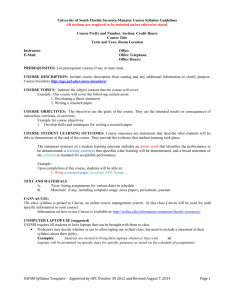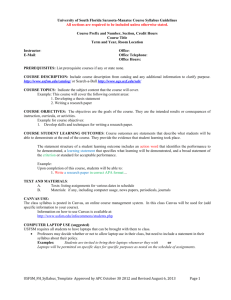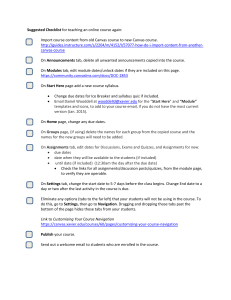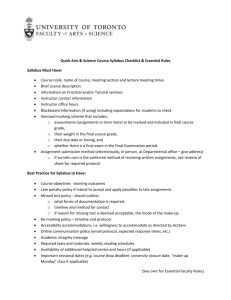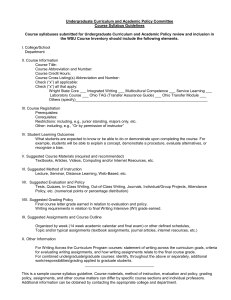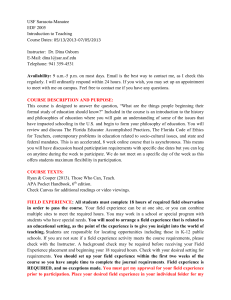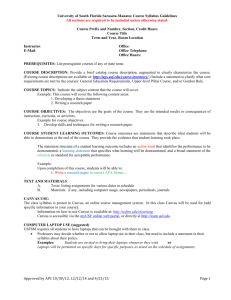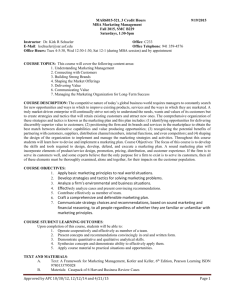USFSM_FH_Syllabus_Template_without-policies
advertisement
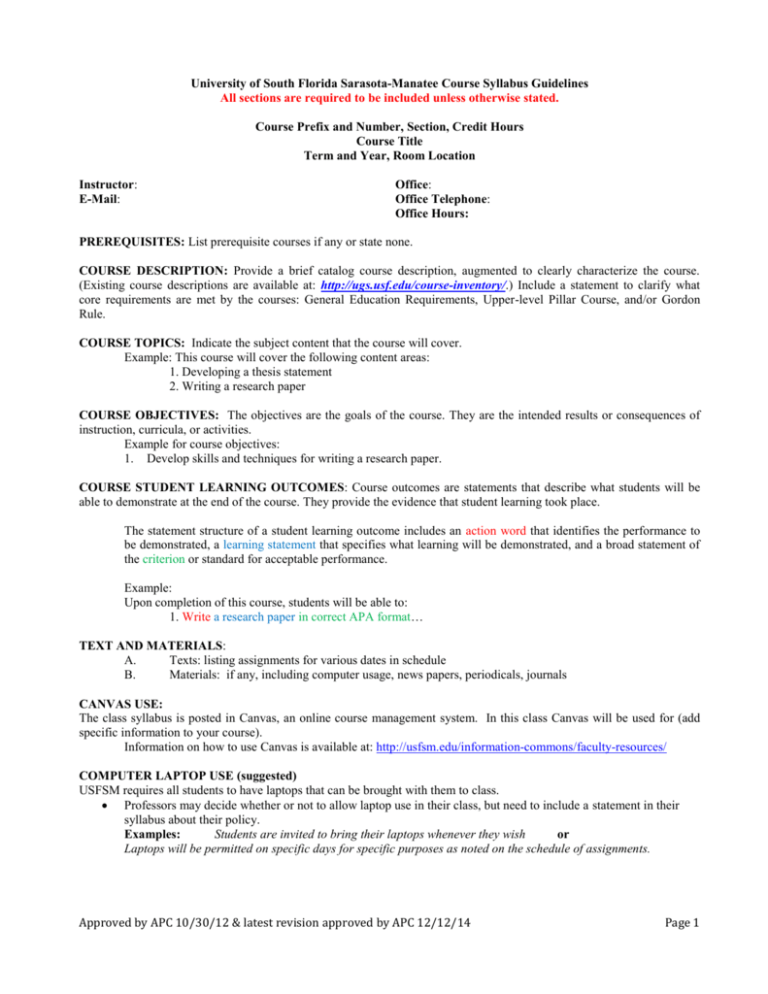
University of South Florida Sarasota-Manatee Course Syllabus Guidelines All sections are required to be included unless otherwise stated. Course Prefix and Number, Section, Credit Hours Course Title Term and Year, Room Location Instructor: E-Mail: Office: Office Telephone: Office Hours: PREREQUISITES: List prerequisite courses if any or state none. COURSE DESCRIPTION: Provide a brief catalog course description, augmented to clearly characterize the course. (Existing course descriptions are available at: http://ugs.usf.edu/course-inventory/.) Include a statement to clarify what core requirements are met by the courses: General Education Requirements, Upper-level Pillar Course, and/or Gordon Rule. COURSE TOPICS: Indicate the subject content that the course will cover. Example: This course will cover the following content areas: 1. Developing a thesis statement 2. Writing a research paper COURSE OBJECTIVES: The objectives are the goals of the course. They are the intended results or consequences of instruction, curricula, or activities. Example for course objectives: 1. Develop skills and techniques for writing a research paper. COURSE STUDENT LEARNING OUTCOMES: Course outcomes are statements that describe what students will be able to demonstrate at the end of the course. They provide the evidence that student learning took place. The statement structure of a student learning outcome includes an action word that identifies the performance to be demonstrated, a learning statement that specifies what learning will be demonstrated, and a broad statement of the criterion or standard for acceptable performance. Example: Upon completion of this course, students will be able to: 1. Write a research paper in correct APA format… TEXT AND MATERIALS: A. Texts: listing assignments for various dates in schedule B. Materials: if any, including computer usage, news papers, periodicals, journals CANVAS USE: The class syllabus is posted in Canvas, an online course management system. In this class Canvas will be used for (add specific information to your course). Information on how to use Canvas is available at: http://usfsm.edu/information-commons/faculty-resources/ COMPUTER LAPTOP USE (suggested) USFSM requires all students to have laptops that can be brought with them to class. Professors may decide whether or not to allow laptop use in their class, but need to include a statement in their syllabus about their policy. Examples: Students are invited to bring their laptops whenever they wish or Laptops will be permitted on specific days for specific purposes as noted on the schedule of assignments. Approved by APC 10/30/12 & latest revision approved by APC 12/12/14 Page 1 PLAGIARISM SOFTWARE (if applicable) Instructors are encouraged to use the “TURNITIN” application via Canvas whenever possible to assist students in avoiding plagiarism. If used instructors must include the following statement in the course syllabus: The University of South Florida has an account with an automated plagiarism detection service which allows student assignments be checked for plagiarism. I reserve the right to ask students to submit their assignments to Turnitin through Canvas. Assignments are compared automatically with a database of journal articles, web articles, and previously submitted papers. The instructor receives a report showing exactly how a student’s paper was plagiarized. PLEASE REMOVE YOUR NAME FROM THE BODY OF YOUR PAPER AND REPLACE IT WITH YOUR USF ID#. ALSO REMOVE YOUR NAME FROM THE FILE NAME AND REPLACE IT WITH YOUR USF ID# (e.g., “U12345678 Essay 1.docx”) BEFORE SUBMITTING IT TO TURNITIN. Pursuant to the provisions of the Family Educational Rights and Privacy Act (FERPA), students are requested to maintain confidentiality as a way to keep their personal contact information (i.e. name, address, telephone) from being disclosed to vendors or other outside agencies. By your submission, you are also agreeing to release your original work for review for academic purposes to Turnitin. GRADING, EVALUATION AND ATTENDANCE POLICIES: A. USFSM policy requires that all students receive a graded assignment or examination prior to the semester’s drop/withdraw date B. Specifically state the value of and the manner in which each assignment in the syllabus will be evaluated or graded. C. A precise description of the grading process, e.g. use of plus or minus grading, use of straight A,B,C,D and F system, point system with delineations of grades for accumulation of a stipulated number of points, etc. D. Attendance policy to include make up of missed work. USFSM AND USF SYSTEM POLICIES [Insert new policies here] GENERAL INSTRUCTION FOR STUDENTS (suggested) A. Provide students information about taping class lectures. B. Provide students information about sharing notes with other students who may miss class. C. Academic Support Services: Information Commons provides students with individual and group study spaces, computers, printers, and various media equipment for temporary use. Information Commons is staffed with a librarian, learning support faculty, tutors, and technology and e-learning specialists. Students challenged by the rigors of academic writing, mathematics, or other course content are urged to contact their professors early in the semester to chart out a plan for academic success, and/or regularly use the tutoring services provided by the Learning Support Services, which are provided at no cost to students. COURSE SCHEDULE: A. Dates of scheduled exams. B. Assignments and due dates. C. Note the last day to drop class with a “W” Approved by APC 10/30/12 & latest revision approved by APC 12/12/14 Page 2
